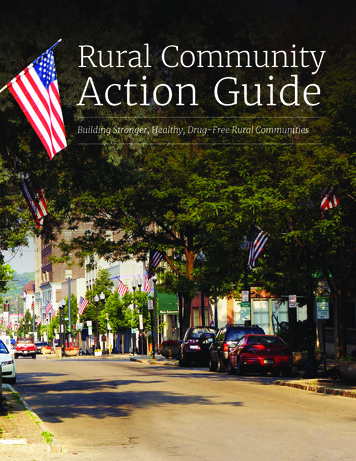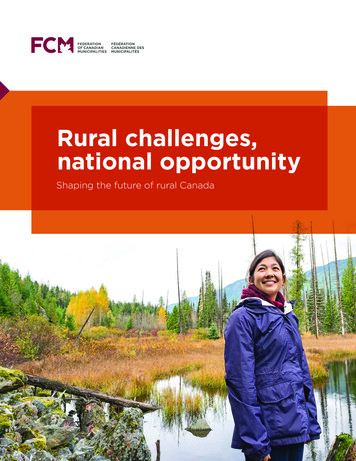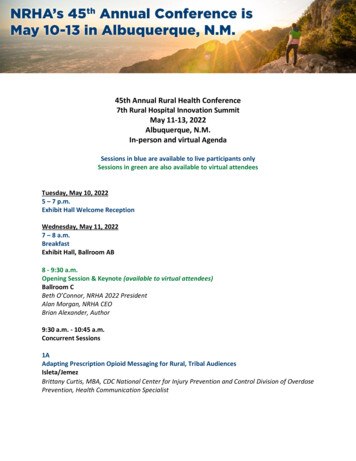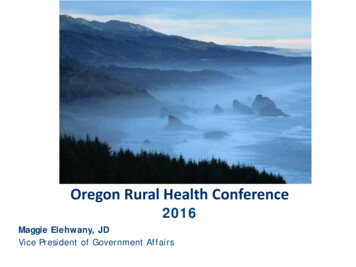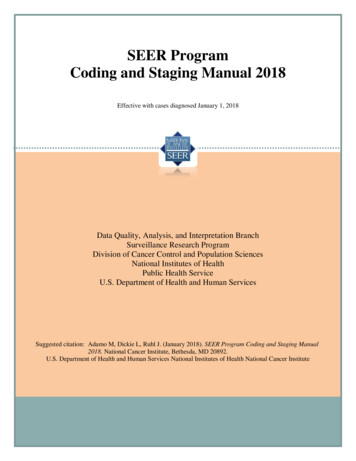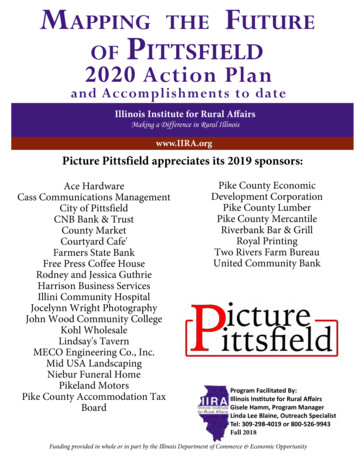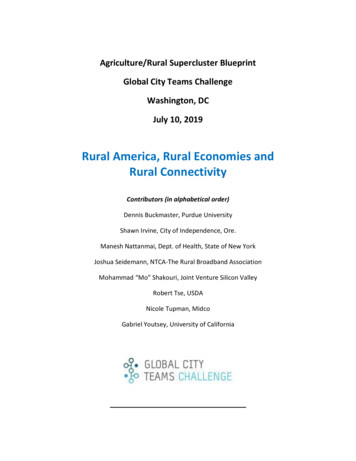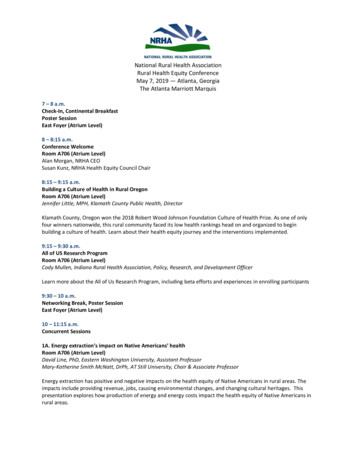
Transcription
National Rural Health AssociationRural Health Equity ConferenceMay 7, 2019 — Atlanta, GeorgiaThe Atlanta Marriott Marquis7 – 8 a.m.Check-In, Continental BreakfastPoster SessionEast Foyer (Atrium Level)8 – 8:15 a.m.Conference WelcomeRoom A706 (Atrium Level)Alan Morgan, NRHA CEOSusan Kunz, NRHA Health Equity Council Chair8:15 – 9:15 a.m.Building a Culture of Health in Rural OregonRoom A706 (Atrium Level)Jennifer Little, MPH, Klamath County Public Health, DirectorKlamath County, Oregon won the 2018 Robert Wood Johnson Foundation Culture of Health Prize. As one of onlyfour winners nationwide, this rural community faced its low health rankings head on and organized to beginbuilding a culture of health. Learn about their health equity journey and the interventions implemented.9:15 – 9:30 a.m.All of US Research ProgramRoom A706 (Atrium Level)Cody Mullen, Indiana Rural Health Association, Policy, Research, and Development OfficerLearn more about the All of Us Research Program, including beta efforts and experiences in enrolling participants9:30 – 10 a.m.Networking Break, Poster SessionEast Foyer (Atrium Level)10 – 11:15 a.m.Concurrent Sessions1A. Energy extraction’s impact on Native Americans’ healthRoom A706 (Atrium Level)David Line, PhD, Eastern Washington University, Assistant ProfessorMary-Katherine Smith McNatt, DrPh, AT Still University, Chair & Associate ProfessorEnergy extraction has positive and negative impacts on the health equity of Native Americans in rural areas. Theimpacts include providing revenue, jobs, causing environmental changes, and changing cultural heritages. Thispresentation explores how production of energy and energy costs impact the health equity of Native Americans inrural areas.
Opportunities for Health Equity in Rural Tribal OklahomaDenna Wheeler, Ph.D., Oklahoma State University Center for Health Sciences, the Center for Rural Health, ClinicalAssociate Professor of Rural HealthWilliam Pettit, D.O., Oklahoma State University Center for Health Sciences, Dean, Oklahoma State UniversityCollege of Osteopathic Medicine - Cherokee Nation CampusLearn about the physician pipeline partnership between the Oklahoma State University College of OsteopathicMedicine and Cherokee Nation. The pipeline includes early recruitment in rural native communities, a medicalschool campus constructed and operated in partnership on Cherokee Nation land, and tribal affiliated medicalresidency programs.1B. Creating a Culture of Health in AppalachiaRoom A708 (Atrium Level)Julie Marshall, PhD, Appalachian Regional Commission, Senior EconomistEric Stockton, Appalachian Regional Commission, Health Program ManagerThis initiative documents population health and disparities in the Appalachian Region as well as assets and barriersto achieving positive health outcomes. It also identifies and explores Bright Spots, and offers practical strategies tocommunity leaders, funders, and policy makers pursuing health equity and improved population health in ruralcommunities.Healthalachia: Rural Appalachian Youth Creating SolutionsFrances Feltner, DNP, University of Kentucky Center of Excellence in Rural Health, DirectorMelissa Slone, University of Kentucky Center of Excellence in Rural Health, Director of Inter-disciplinary ResearchBeth Bowling, University of Kentucky Center of Excellence in Rural Health, Rural Project ManagerHealthalachia, a student-based research initiative, engaged students from three rural high schools to identify ahealth or social problem at their school and create a research-based solution. Students developed a researchquestion and implementation strategies, secured resources and personnel, created an evaluation process andmeasured outcomes to complete their projects.1C. Evaluating with an Equity Lens in Rural CommunitiesRoom A703 (Atrium Level)Samantha Tucker, Healthcare Georgia Foundation, Evaluation ManagerApril Hermstad, Emory Prevention Research Center, Rollins School of Public Health, Emory University, Senior PublicHealth Program AssociateHow do you know your organization is addressing health equity and closing the gap? The answer is evaluating withan equity lens. Join as Healthcare Georgia Foundation and Emory Prevention Research Center discuss identifyingand measuring equity outcomes and indicators in the context of rural, multi-sectoral Community HealthPartnerships.Capacity Building in Rural Communities to Improve Health OutcomesCalvin Allen, Rural Forward NC at the Foundation for Health Leadership and Inn, DirectorBrandy Bynum Dawson, Rural Forward NC at the Foundation for Health Leadership and Inn, Associate DirectorThis informative session will highlight effective services and tools employed to build capacity and developresources that amplify the impact of rural leaders, organizations, and coalitions in rural North Carolina. The sessionwill provide examples of healthier, more sustainable rural communities with increased capacity to solve their ownhealth problems.11:15 a.m. – 12:30 p.m.
Concurrent Session2A. Elevating Rural Health Needs in HIV, Hepatitis C, and Opioid AbuseRoom A706 (Atrium Level)Kevin P. Delaney, MPH, PhD, Centers for Disease Control and Prevention, Team Lead for the Special Studies andDiagnostics Team, Division of HIV/AIDS PreventionMichelle Van Handel, MPH, Centers for Disease Control and Prevention, Associate Director of the Program andPerformance Improvement OfficeDita Broz, PhD MPH, Centers for Disease Control and Prevention, Epidemiologist on the Behavioral SurveillanceTeam, Division of HIV/AIDS PreventionThe Ending the HIV Epidemic Initiative seeks to reduce new HIV infections by at least 90% in 10 years. Addressingthe interconnected needs around HIV, hepatitis C, and opioid abuse treatment and prevention in rural areas is keyto achieving this goal. This panel will provide an overview of the Ending the HIV Epidemic Initiative, vulnerablecounties at risk of increases in HIV and hepatitis C among people who inject drugs, and public health linkagesbetween HIV, hepatitis C, and opioid misuse.2B. Premature death disparities by rurality, race, and ethnicityRoom A708 (Atrium Level)Katy Kozhimannil, PhD, MPA, University of Minnesota Rural Health Research Center, School of Public Health,Associate Professor and DirectorLeslie Marsh, BS, MSN, MBA, RN, Lexington Regional Health Center, CEOCarrie Henning-Smith, PhD, MPH, MSW, University of Minnesota Rural Health Research Center, School of PublicHealth, Assistant Professor and Deputy DirectorRural communities are increasingly diverse, with 20% of rural residents being people of color. In this session, wewill present new research on racial and ethnic disparities in premature death and other aspects of health andhealthcare among rural residents. We will then discuss implications, including a community-based providerperspective.Rural focus in state maternal mortality review committeesJulia Interrante, University of Minnesota, PhD StudentKaty Kozhimannil, PhD, MPA, University of Minnesota, Associate ProfessorRural women experience barriers to maternity care and have worse outcomes. Maternal mortality reviewcommittees are forming in response to rising maternal deaths. This session will show committees existed in 47states by 2018; only three mentioned rurality specifically. Rural representation is needed to inform geographicallytailored efforts to reverse trends.2C. Health, Justice, and the Role of Civil Rights Law in Public HealthRoom A703 (Atrium Level)Dawn Pepin, JD, CDC, Public Health Analyst - LegalSamantha Bent Weber, JD, Georgia Institute of Technology/Georgia State University, PhD StudentDiscrimination contributes to significant health disparities in the US today including rural communities. Outcomessuch as lower paying jobs and limited educational opportunities all contribute to health inequities. Thispresentation will highlight variations in civil rights laws across the 50 states and will draw together laws and publichealth data.Voting rights and implications on rural health equityDavid Line, PhD, Eastern Washington University, Assistant ProfessorMary-Katherine Smith McNatt, DrPh, A.T. Still University, Chair & Associate Professor
With an appreciation of “health in all policies,” the importance of representation in the development of policieshas become evident. Recent voter suppression has impacted the health equity in rural communities. This sessionlooks at disenfranchisement methods, the implications on rural health, and practices used to addressdisenfranchisement.12:30 p.m. – 1:30 p.m.Networking LunchRoom A707 (Atrium Level)1:30 p.m. – 2:30 p.m.Health Equity: Where We’ve Been, Where We’re GoingRoom A706 (Atrium Level)Leandris Liburd, PhD, MPH, MA, Office of Minority Health and Health Equity at CDC, Associate DirectorCara James, PhD, Office of Minority Health - Centers for Medicare & Medicaid Services, DirectorDeborah Fournier, JD, Association of State and Territorial Health Officials, Senior DirectorModerator: Karen Bouye, PhD, MPH, MS, Centers for Disease Control and Prevention, Senior AdvisorPublic health and healthcare have increasingly focused on health equity as a means of achieving improvedpopulation health. Access to health insurance and healthcare are not sufficient to eliminate health disparities. Thispanel will present public health leaders’ perspectives on health equity and implications for rural health.2:30 p.m. – 2:45 p.m.Networking Break, Poster SessionEast Foyer2:45 – 4:00 p.m.Concurrent Session3A. Community-Cancer Center Collaborations to Impact Rural Cancer DisparitiesRoom A706 (Atrium Level)Robin Vanderpool, DrPH, CHES, University of Kentucky, Associate Professor, Department of Health, Behavior &SocietyDeanna Kepka, PhD, University of Utah Huntsman Cancer Institute, Assistant ProfessorTracy Onega, PhD, Dartmouth Norris Cotton Cancer Center, Associate ProfessorThis session, presented by three National Cancer Institute-designated cancer centers serving different ruralconstituents (Appalachia, Inter-Mountain West, and New England), will focus on building capacity among ruralcommunity and clinical partners to conduct cancer control research aimed at improving disparities in HPVvaccination, lung cancer screening, and cancer survivorship outcomes.Embracing Health Equity: A Place-Based ApproachLisa Medellin, Healthcare Georgia Foundation, Director of ProgramsArlene Parker Goldson, Partnership for Southern Equity, Just Health ManagerThe Two Georgias Initiative-a rural program for 11 communities in Georgia focused on engaging localcoalitions/health partnerships on embracing equity in the context of addressing local healthcare issues.3B. Tools for Success: Addressing the Rural Opioid CrisisRoom A708 (Atrium Level)Alana Knudson, PhD, NORC's Walsh Center for Rural Health Analysis, Program Area DirectorKristine Sande, Rural Health Information Hub, Program Director
Explore new tools from the Rural Health Information Hub (RHIhub) and the NORC Walsh Center for Rural HealthAnalysis designed to help rural communities successfully address the opioid crisis. Learn about factors, includingsocial determinants of health that influence opioid use and access to treatment.3C. Strategies for academic - rural community health equity partnershipsRoom A703 (Atrium Level)Matthew Tobey, MD, Massachusetts General Hospital, Fellowship DirectorLarge academic health centers have historically neglected low-resource rural communities. In this session, wedescribe the lessons learned from a successful partnership between a large teaching hospital and a resourcelimited rural community. Topics will include cultural humility, Indian Health Service partnership strategies, andtribal partnerships.4:00 – 5:15 p.m.Speaker – Healthy People 2030Room A706 (Atrium Level)David Line, PhD, Eastern Washington University, Assistant ProfessorStan Lehman, MPH, CDC, Office of the Associate Director for Policy and Strategy, Program Performance andEvaluation Office5:15 p.m.Conference AdjournsPostersCreative Approaches to Meeting Diabetes-Related Needs in Rural FloridaAnudeep Udumula, Student Researcher, University of Central FloridaCreation of a RNPC Training Program: Meeting the Needs of Undeserved and Rural PopulationsJene Hurlbut, PhD, Professor, Roseman University of Health SciencesRacial/Ethnic Disparities In Assault/Firearm Traumatic Brain Injury in VeteransClara Dismuke, PhD, Research Health Scientist, HERC, Palo Alto VA Medical SystemMapping Cervical Cancer Access and Prevention in SCJan Eberth, PhD, Associate Professor, University of South CarolinaYouth Engagement and Action for Health (YEAH!)Katie OConnell, Graduate Research Assistant, Healthy Places Lab at Georgia Institute of TechnologyEarly Care and Education Recognition in FloridaFairuz Priya, Early Care and Education in Florida, Florida Department of HealthCHW Training Development: tobacco cessation with MCH focusDenise Martinez, BA, MPH, CHWI, Training Center Manager, National Community Health Worker Training CenterEliminating Mental Health Stigma in Rural CommunitiesKim Nordin, Senior Program Coordinator, National Rural Health Resource CenterMediterranean Diet Adherence and Depression among Rural AdultsTatiana Bryan, University of Florida, Undergraduate Student (Recent graduate, BS) - Family, Youth and CommunitySciencesExploring the Health Behaviors of Rural Minority ChildrenRomae Morgan, University of Florida, Undergraduate Student (Recent graduate, BS) - Nutritional SciencesFinancial Strain and Heath Behaviors among Rural MinoritiesBiswadeep Dhar, MS, MEd, University of Florida, Doctoral Student - Youth Development and Family SciencesCapitalizing on Rural Nimbleness to Integrate Behavioral HealthRhonda Barcus, Program Manager, National Rural Health Resource CenterInterventions Engaging CHWs to Increase Appropriate Cancer ScreeningJamaicia Cobb, ORISE Fellow, Centers for Disease Control and PreventionStrengthening Rural Primary Care Clinics using the 3i'sIpe Paramel, Project Manager & Practice Facilitator, OSU Center for Health Systems Innovation
Free Rides: Patient and Clinic Benefits in a Rural Pediatric ClinicIpe Paramel, Project Manager & Practice Facilitator, OSU Center for Health Systems InnovationA Misunderstanding of Biology: Stigma Surrounding MAT & OUDRebecca Christopher, Field Education Coordinator, University of South Carolina College of Social WorkComparative Analysis of Medicaid Expansion on Rural HealthcareLesley Clack, ScD, Assistant Professor, University of GeorgiaOMT and Demographics of Back Pain in AppalachiaJennifer Bannister, OMS-4, West Virginia School of Osteopathic MedicineDelivery of Ultrasound Imaging for Central AppalachiaMark Herzog, Health Policy Fellow, Harvard Medical SchoolTele-Colposcopy for Vulnerable Women in Central AppalachiaMark Herzog, Health Policy Fellow, Harvard Medical SchoolMobile Clinic Delivery of Chronic Disease CareMark Herzog, Health Policy Fellow, Harvard Medical SchoolRace/Ethnicity and Smoking Across Rural AmericaGilberto Lopez, ScD, Research Assistant Professor, University of Rochester Medical CenterIntegrating Oral Health into Pregnancy and Infant CareCraig Holden, PhD, MPH, Health Researcher, Altarum InstituteSyringe service program utilization in rural KentuckyHilary Surratt, PhD, Associate Professor, University of KentuckyDescribing Vulnerability Resiliency among Mississippi Vietnamese through PhotovoiceSusan Mayfield-Johnson, PhD, MCHES, Assistant Professor, The University of Southern MississippiNeeds Assessment on Oral Health Rational Service AreasShen Wang, MPH, MPA, Research Associate, Center for Health Workforce StudiesCancer Mortality in Rural America, 1999-2016Jane Bolin, RN, JD, PhD, Associate Dean and Professor, Texas A&M College of Nursing and School of Public HealthAssociations among Rural Hospital Nursing Resources and OutcomesJessica Smith, PhD, Assistant Professor, University of Texas at ArlingtonAssessing Mechanisms for Psychological Resilency following Natural DisastersBrianna Baker, UNC Center for Health Equity ResearchAfrican American Baby Boomers' and Electronic Health RecordsAlesha Ray, DBA, Northcentral UniversitySIDS Risk Depends on More than a CribAnn Lambert, RN, MSN, PCPNP-BC, Associate Clinical Professor, Doctoral Student, Auburn University School ofNursingRural African American Adolescent SuicideJames, Perkins, MD, PhD, Manager, Black Bottom IncExhibitorsAll of UsNational Multiple Sclerosis SocietyUSDA Rural DevelopmentSocial Security AdministrationSponsorsHealthcare Georgia FoundationThank you for your attendance and your continued support of NRHA and the Health EquityConference! Join us next year in San Diego, CA on May 18, 2020.
All of US Research Program Room A706 (Atrium Level) Cody Mullen, Indiana Rural Health Association, Policy, Research, and Development Officer Learn more about the All of Us Research Program, including beta efforts and experiences in enrolling participants 9:30 - 10 a.m. Networking Break, Poster Session East Foyer (Atrium Level) 10 - 11:15 a.m.


